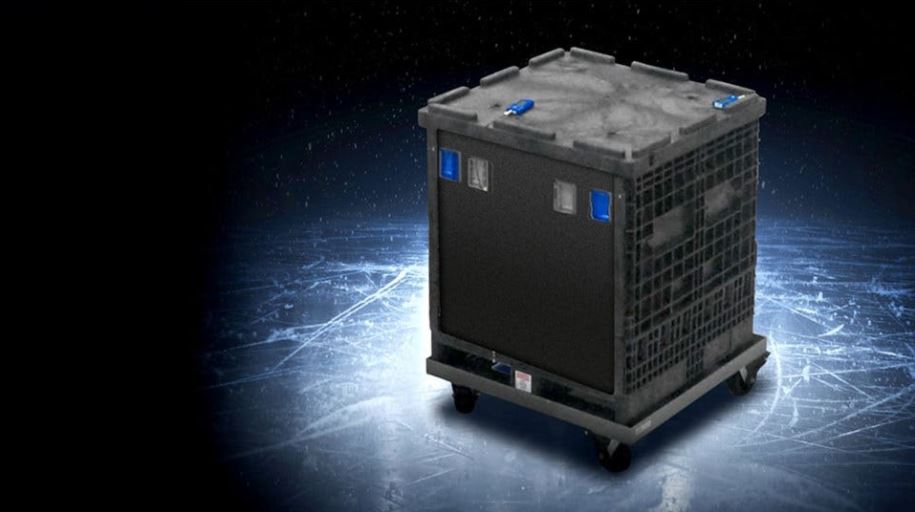Pitch Win Boosts Freezer ‘Pod’ for Vaccines
Subscriber Benefit
As a subscriber you can listen to articles at work, in the car, or while you work out. Subscribe Now
If the brilliant engineering minds at Rolls-Royce in Indianapolis know how to cool fire-hot jet engines, perhaps they could also help surmount one of the biggest challenges in the global distribution of Covid-19 vaccines: keeping them cold. The concept has crystalized into an Indiana-made freezer “pod” called ArcticRx, which its creators say can keep contents at an ultra-low temperature—with no electricity or batteries—for about 30 days. The pod recently won an Indiana pitch competition—proof that the ability to “cool your jets” could help get frozen Covid-19 vaccines to low-income regions around the world.
“[Rolls-Royce engineers] saw the need and basically said, ‘We do intricate thermal performance calculations for engines; we can probably create something pretty elegant for the cold chain too. So let’s think about how to achieve that,’” says ChefsFridge co-founder Stuart Lowry.
The manufacturing powerhouse and Anderson-based startup were connected through Elevate Ventures in Indianapolis, which helped uncover their complementary expertise. ChefsFridge had developed a cooling technology to help address challenges in the restaurant business and food deserts. But the pandemic threw the startup a curveball; ChefsFridge decided to return funding dollars to its lead investor, a hospitality business owner who was hit hard by the shutdown. A search for new funding options led the startup to Elevate Ventures, which forged the connection to the Rolls-Royce engineers through “a little bit of serendipity,” says ChefsFridge co-founder and President Shane Bivens.
The ArcticRx pod aims to bridge the chasmic gap in the cold chain that’s crippling access to Covid-19 vaccinations in low-income countries. Research from the Global Change Data Lab shows that less than 2.5% of low-income countries have received a single dose of a Covid-19 vaccine. The World Health Organization says up to 50% of vaccines for a variety of diseases are wasted globally each year, largely due to “lack of temperature control and the logistics to support an unbroken cold chain.”
ChefsFridge believes ArcticRx is “vaccine equity in a box.” About the size of a dishwasher, the passive ultra-low temperature (ULT) delivery pod can maintain -80 degree Celsius with no electricity or battery for about 30 days on a single charge. Its creators say the pod can store thousands of doses of a given vaccine and is designed to make multiple trips.
While the team can’t share specifics about how the pod functions, Bivens says it uses dry ice, and “the configuration of the materials inside” allows it to maintain the ULT storage.
“It’s not necessarily that we’ve developed some new fluid, new foam, or some new component,” says Bivens. “We’re managing the circuits…where the temperature could escape…and really try to minimize those. We also…used more robust materials; how people are configuring [coolers] today and what could be done to improve that. We made some major improvements on how it’s configured, but also simplified the designs that already exist.”
Lowry says winning the 2021 Crossroads Pitch Competition at The Mill, Bloomington’s center for entrepreneurship, is “a huge milestone” in terms of “awareness and validation.” While the team searched the world for experts to help develop ArcticRx, their inquiries repeatedly led back to the Hoosier state, “everything in the pod has been designed in Indiana,” says Bivens.
“We have some of the best engineering minds in the world,” says Lowry. “And we were kind of incredulous about trying to [design] something without being able to plug it in. When you look at the low-income countries and where the high need is—where there’s less than 5% vaccination rates—they don’t have power or access to electricity. They probably have no ULT freezers within a great distance of their communities. It’s a very proud element of ArcticRx that we’re able to achieve something that hasn’t been done.”
While Covid initiated the development of ArcticRx, the pod could be used for other biologics or vaccines; the Ebola vaccine, for example, also requires ULT. Bivens says “the market is massive,” with some $24 billion spent each year on storing and transporting products that require cryo temperature. The team is working to attract funding, which will help ArcticRx clear regulatory hurdles and expand field testing.
“It’s exciting to take a passionate idea that’s built from the heart of cooling engineers, our staff and everyone involved in ArcticRx who really want to make a difference in the world,” says Lowry. “You don’t often get a chance to do something that’s this important and can literally save lives and change how you get things around the world.”
Lowry says Rolls-Royce realized working with a startup would streamline the path to market for ArcticRx.
Bivens says ArcticRx was designed in Indiana, and all five prototypes have also been manufactured in the Hoosier state.
